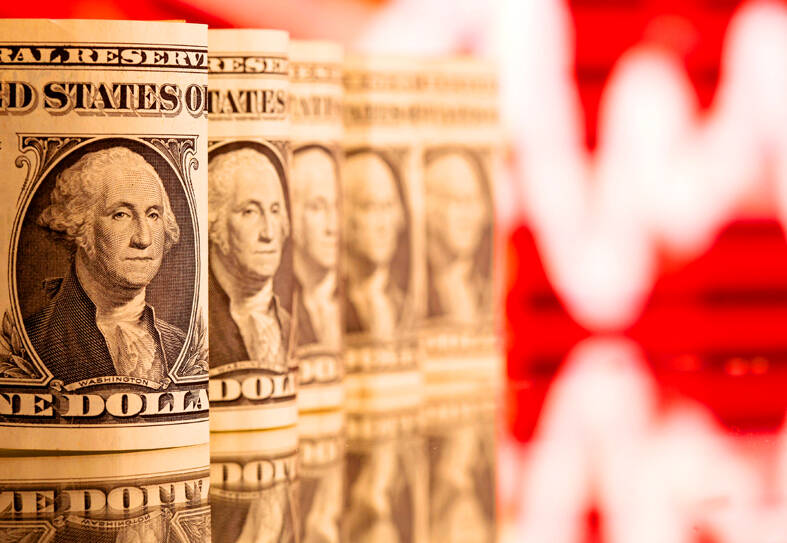The US remained the largest debtor nation to Taiwanese banks for the 38th consecutive quarter as of the end of December last year, the central bank said on Friday.
Taiwanese banks’ exposure to the US totaled US$176.997 billion, a 2.74 percent decline from the previous quarter, central bank data showed.
The decrease reflects growing caution among businesses amid global economic uncertainties, leading to slower investment and borrowing, Department of Financial Inspection Deputy Director-General Hsieh Jen-chun (謝人俊) said.

Photo: Reuters
In addition, a wave of redemptions by Taiwanese investors in US mutual funds contributed to the reduction in US exposure, Hsieh said.
The US accounted for 29.53 percent of Taiwanese banks’ total international claims at the end of December last year, compared with 29.81 percent at the end of September in the same year, he said.
China remained the second-largest debtor nation to the local banking system, with exposure at US$46.94 billion, a 2.75 percent decrease from the previous quarter.
After the US and China, Luxembourg ranked third with exposure from Taiwanese banks at US$44.20 billion, a 0.92 percent decrease from the previous quarter, followed by Australia (US$37.86 billion, down 5.79 percent) and Japan (US$34.50 billion, down 2.84 percent).
Rounding out the top 10 debtor economies were Hong Kong with exposure of about US$31.82 billion (down 1.15 percent from the previous quarter), followed by the UK (US$20.08 billion, down 2.34 percent), Singapore (US$17.80 billion, up 0.10 percent), South Korea (US$17.13 billion, down 0.76 percent) and France (US$15.83 billion, down 0.95 percent).
Combined exposure to the top 10 debtor nations totaled US$443.2 billion, accounting for 73.93 percent of Taiwanese banks’ total international claims as of the end of December last year, the central bank said.
Overall, Taiwanese banks’ international claims — comprising loans, investments, deposits and other holdings on a direct risk basis — dropped US$11 billion from the previous quarter to US$599.4 billion, ending a four-quarter streak of increases, central bank data showed.
Hsieh said the decline in aggregate exposure was due to a decrease in interbank lending and the depreciation of non-US dollar currencies against the greenback.
In the final quarter of last year, the won, Australian dollar, yen, euro and yuan weakened 10.85 percent, 10.22 percent, 8.87 percent, 6.81 percent and 3.88 percent respectively against the US dollar, he said.

Greek tourism student Katerina quit within a month of starting work at a five-star hotel in Halkidiki, one of the country’s top destinations, because she said conditions were so dire. Beyond the bad pay, the 22-year-old said that her working and living conditions were “miserable and unacceptable.” Millions holiday in Greece every year, but its vital tourism industry is finding it harder and harder to recruit Greeks to look after them. “I was asked to work in any department of the hotel where there was a need, from service to cleaning,” said Katerina, a tourism and marketing student, who would

i Gasoline and diesel prices at fuel stations are this week to rise NT$0.1 per liter, as tensions in the Middle East pushed crude oil prices higher last week, CPC Corp, Taiwan (台灣中油) and Formosa Petrochemical Corp (台塑石化) said yesterday. International crude oil prices last week rose for the third consecutive week due to an escalating conflict between Israel and Iran, as the market is concerned that the situation in the Middle East might affect crude oil supply, CPC and Formosa said in separate statements. Front-month Brent crude oil futures — the international oil benchmark — rose 3.75 percent to settle at US$77.01

Merida Industry Co (美利達) has seen signs of recovery in the US and European markets this year, as customers are gradually depleting their inventories, the bicycle maker told shareholders yesterday. Given robust growth in new orders at its Taiwanese factory, coupled with its subsidiaries’ improving performance, Merida said it remains confident about the bicycle market’s prospects and expects steady growth in its core business this year. CAUTION ON CHINA However, the company must handle the Chinese market with great caution, as sales of road bikes there have declined significantly, affecting its revenue and profitability, Merida said in a statement, adding that it would

UNCERTAINTIES: The world’s biggest chip packager and tester is closely monitoring the US’ tariff policy before making any capacity adjustments, a company official said ASE Technology Holding Inc (日月光投控), the world’s biggest chip packager and tester, yesterday said it is cautiously evaluating new advanced packaging capacity expansion in the US in response to customers’ requests amid uncertainties about the US’ tariff policy. Compared with its semiconductor peers, ASE has been relatively prudent about building new capacity in the US. However, the company is adjusting its global manufacturing footprint expansion after US President Donald Trump announced “reciprocal” tariffs in April, and new import duties targeting semiconductors and other items that are vital to national security. ASE subsidiary Siliconware Precision Industries Co (SPIL, 矽品精密) is participating in Nvidia